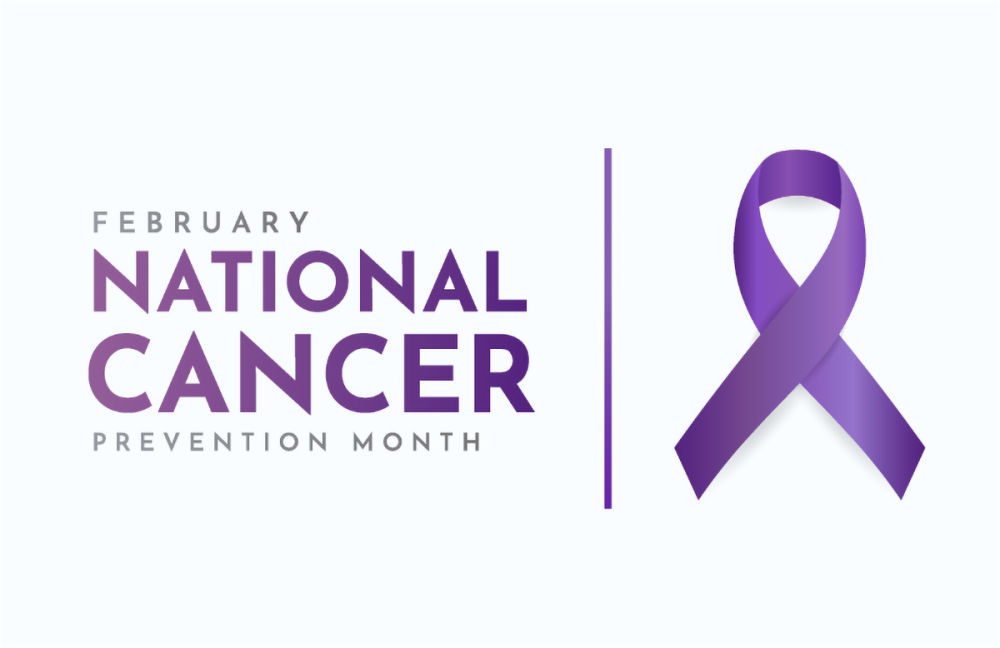Roughly 2 million people are diagnosed with cancer each year in the United States, according to the National Institutes of Health, with 30-50% of all cancer diagnoses being linked to a preventable cause.
National Cancer Prevention Month aims to educate people about the steps they can take to help reduce cancer risk and maintain a healthier, longer life.
6 TIPS FOR REDUCING YOUR CANCER RISK
1. Maintain a Healthy Weight and Active Lifestyle
- Follow a healthy eating pattern that includes plenty of fruits, vegetables, and whole grains. According to research from the American Cancer Society, about 5% of cancer cases in men and about 10% of cancer cases in women in the United States are linked to having excess body weight. Excess body weight is also linked with about 7% of all cancer deaths.
- Limit processed meats, alcohol, sugary drinks, and highly processed foods. Risk of cancer increases with the amount of alcohol consumed. In 2020, alcohol-attributable cancers were estimated to be responsible for 741,300 deaths worldwide.
- Include at least 30 minutes of physical activity in your daily routine. Even better, strive for at least 150 minutes a week of moderate aerobic activity or 75 minutes a week of vigorous aerobic physical activity. Incorporate strength training exercises at least 2 days per week.
2. Avoid Smoking and Tobacco Products
- All forms of tobacco products have many chemicals that damage DNA and cause cancer. Tobacco smoke has more than 7000 chemicals, at least 250 are known to be harmful and at least 69 are known to cause cancer. Worldwide, tobacco use is the single greatest avoidable risk factor for cancer mortality and kills more than 8 million people each year, from cancer and other diseases.
- No form of tobacco is safe including cigarettes, e-cigarettes, cigars, chewing tobacco/snuff, hookas/waterpipes, and even secondhand smoke.
- If you need help quitting tobacco, talk to your doctor about products and services available to support you.
Minnesota Oncology offers a smoking cessation program.
3. Sun Protection
- Stay out of the sun between 10:00 a.m. and 4:00 p.m., when UV light is strongest.
- Use sunscreen generously, cover all exposed areas with hats or loose clothing, wear sunglasses that block UV rays, and seek shady areas when outdoors.
- Avoid tanning beds and sun lamps. Tanning bed use has been linked with an increased risk of melanoma, especially if its started before age 30.
4. Get Immunized
- Cancer causing infections, such as hepatitis and human papilloma virus (HPV), are responsible for up to 25% of cancer cases in low- and middle-income countries. There are vaccines that have been proven to be effective to reduce your risk.
- The Human Papillomavirus (HPV) vaccine can significantly decrease the risk of several cancers including cervical, throat, tongue, anal, and other genital cancers. Studies have shown that the vaccine provides close to 100% protection against infections and pre-cancers caused by certain types of HPV.
- The Hepatitis B vaccine decreases the risk for liver cancer. A safe and effective vaccine that offers 98% to 100% protection against hepatitis B is available.
5. Get Screened
- Regular screenings help detect cancers early and maximize your chance for successful treatment. Early detection can save lives.
- Please check out the American Cancer Society’s cancer screening guidelines by age.
6. Know Your Family History
- 5-10% of all cancers are inherited.
- Understanding your family history can help guide you and your physician with the decision of when you need to start cancer screening and whether to consider genetic counseling.
The National Cancer Institute, along with other organizations, continue to research additional ways to prevent cancer.
Sources:
- American Cancer Society
- Centers for Disease Control and Prevention
- Mayo Clinic
- National Cancer Institute
- National Comprehensive Cancer Network
- World Health Organization
- https://www.hhs.gov/sites/default/files/oash-alcohol-cancer-risk.pdf




